Analysis of Leadership, Management, and Operations at Sainsbury Plc
VerifiedAdded on 2020/10/22
|13
|3846
|291
Report
AI Summary
This report provides a detailed analysis of leadership, management, and operations within Sainsbury Plc. It begins by differentiating between leaders and managers, outlining their roles, characteristics, and comparing their similarities and dissimilarities. The report then delves into the functions of a manager, referencing Fayol's principles, and explores various leadership styles, including situational, systems, and contingency leadership, as applied to Sainsbury Plc. Furthermore, the report examines different approaches to operations management used by the company, the role of a store manager, and the importance of operations management. Finally, it identifies external factors impacting operations management and their influence on decision-making processes. The report covers topics such as supply chain management and inventory management and capacity planning.
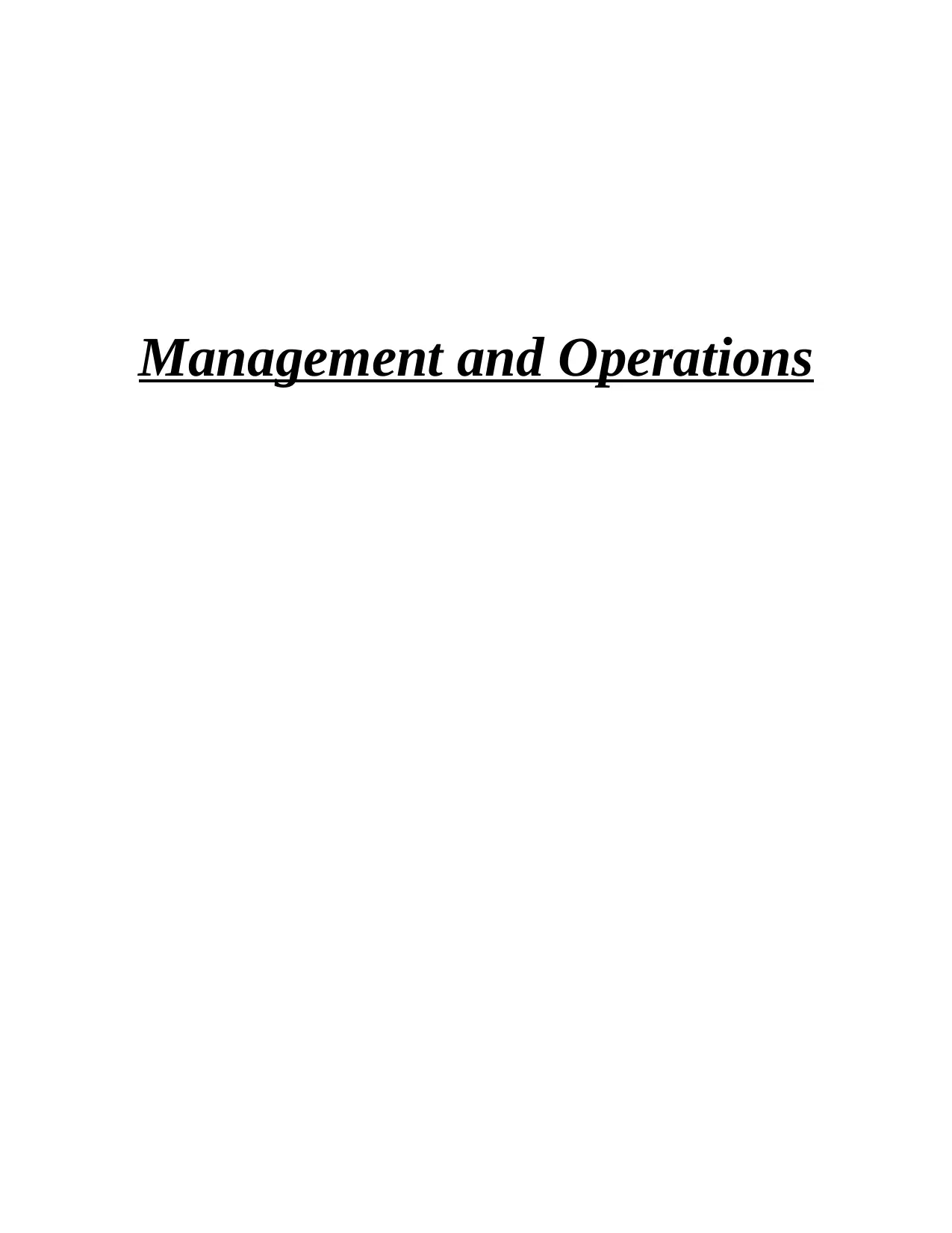
Management and Operations
Paraphrase This Document
Need a fresh take? Get an instant paraphrase of this document with our AI Paraphraser
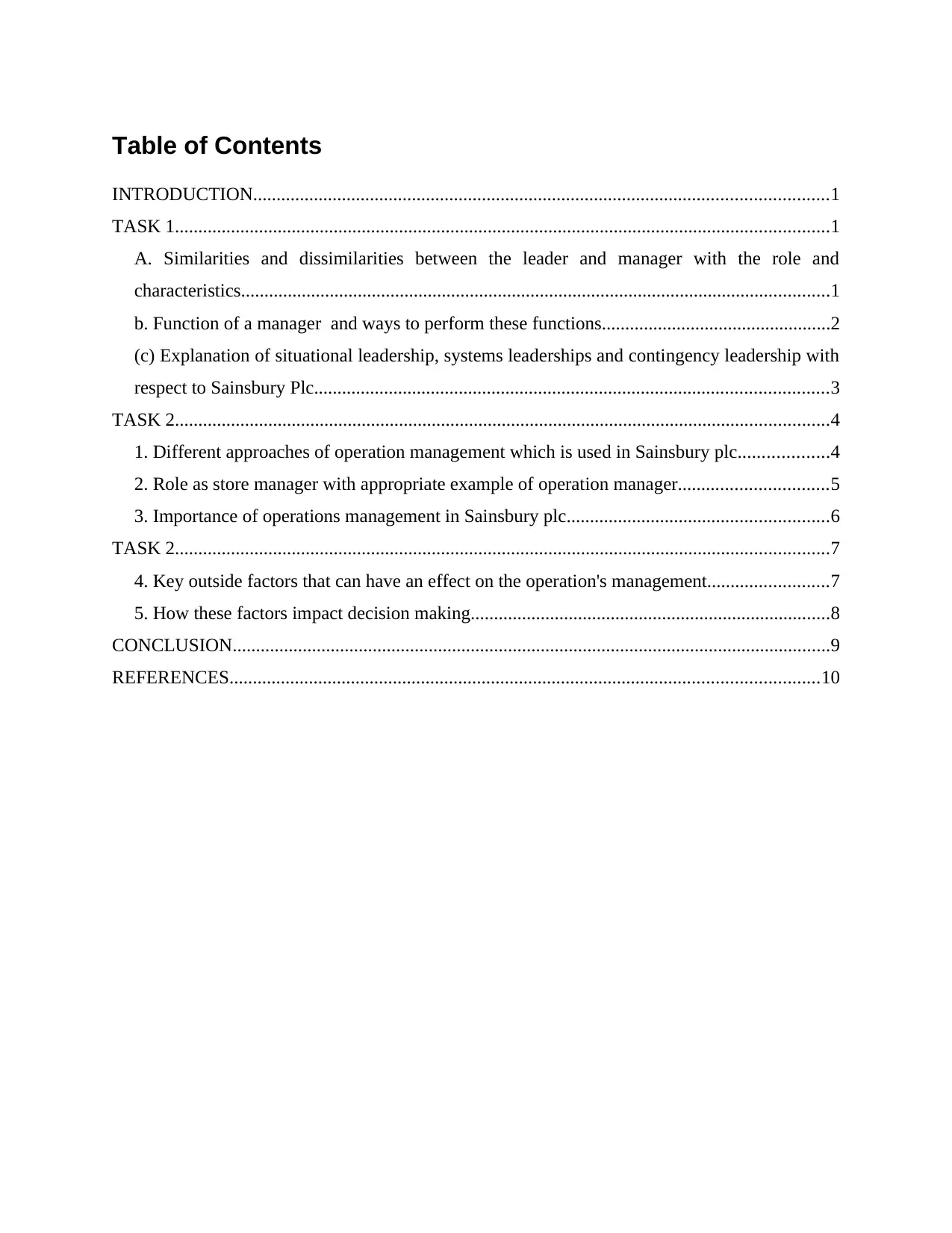
Table of Contents
INTRODUCTION...........................................................................................................................1
TASK 1............................................................................................................................................1
A. Similarities and dissimilarities between the leader and manager with the role and
characteristics..............................................................................................................................1
b. Function of a manager and ways to perform these functions.................................................2
(c) Explanation of situational leadership, systems leaderships and contingency leadership with
respect to Sainsbury Plc..............................................................................................................3
TASK 2............................................................................................................................................4
1. Different approaches of operation management which is used in Sainsbury plc...................4
2. Role as store manager with appropriate example of operation manager................................5
3. Importance of operations management in Sainsbury plc........................................................6
TASK 2............................................................................................................................................7
4. Key outside factors that can have an effect on the operation's management..........................7
5. How these factors impact decision making.............................................................................8
CONCLUSION................................................................................................................................9
REFERENCES..............................................................................................................................10
INTRODUCTION...........................................................................................................................1
TASK 1............................................................................................................................................1
A. Similarities and dissimilarities between the leader and manager with the role and
characteristics..............................................................................................................................1
b. Function of a manager and ways to perform these functions.................................................2
(c) Explanation of situational leadership, systems leaderships and contingency leadership with
respect to Sainsbury Plc..............................................................................................................3
TASK 2............................................................................................................................................4
1. Different approaches of operation management which is used in Sainsbury plc...................4
2. Role as store manager with appropriate example of operation manager................................5
3. Importance of operations management in Sainsbury plc........................................................6
TASK 2............................................................................................................................................7
4. Key outside factors that can have an effect on the operation's management..........................7
5. How these factors impact decision making.............................................................................8
CONCLUSION................................................................................................................................9
REFERENCES..............................................................................................................................10
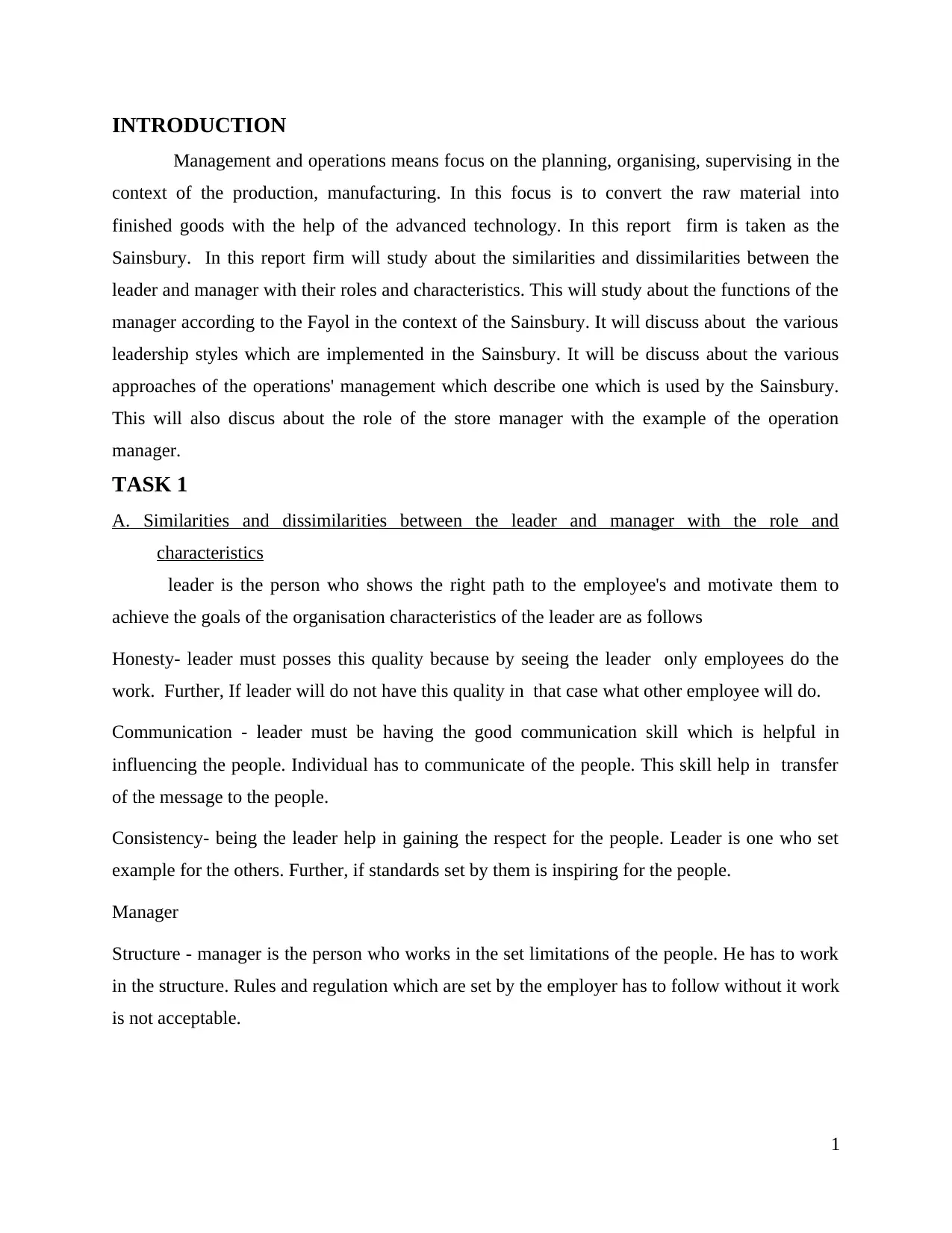
INTRODUCTION
Management and operations means focus on the planning, organising, supervising in the
context of the production, manufacturing. In this focus is to convert the raw material into
finished goods with the help of the advanced technology. In this report firm is taken as the
Sainsbury. In this report firm will study about the similarities and dissimilarities between the
leader and manager with their roles and characteristics. This will study about the functions of the
manager according to the Fayol in the context of the Sainsbury. It will discuss about the various
leadership styles which are implemented in the Sainsbury. It will be discuss about the various
approaches of the operations' management which describe one which is used by the Sainsbury.
This will also discus about the role of the store manager with the example of the operation
manager.
TASK 1
A. Similarities and dissimilarities between the leader and manager with the role and
characteristics
leader is the person who shows the right path to the employee's and motivate them to
achieve the goals of the organisation characteristics of the leader are as follows
Honesty- leader must posses this quality because by seeing the leader only employees do the
work. Further, If leader will do not have this quality in that case what other employee will do.
Communication - leader must be having the good communication skill which is helpful in
influencing the people. Individual has to communicate of the people. This skill help in transfer
of the message to the people.
Consistency- being the leader help in gaining the respect for the people. Leader is one who set
example for the others. Further, if standards set by them is inspiring for the people.
Manager
Structure - manager is the person who works in the set limitations of the people. He has to work
in the structure. Rules and regulation which are set by the employer has to follow without it work
is not acceptable.
1
Management and operations means focus on the planning, organising, supervising in the
context of the production, manufacturing. In this focus is to convert the raw material into
finished goods with the help of the advanced technology. In this report firm is taken as the
Sainsbury. In this report firm will study about the similarities and dissimilarities between the
leader and manager with their roles and characteristics. This will study about the functions of the
manager according to the Fayol in the context of the Sainsbury. It will discuss about the various
leadership styles which are implemented in the Sainsbury. It will be discuss about the various
approaches of the operations' management which describe one which is used by the Sainsbury.
This will also discus about the role of the store manager with the example of the operation
manager.
TASK 1
A. Similarities and dissimilarities between the leader and manager with the role and
characteristics
leader is the person who shows the right path to the employee's and motivate them to
achieve the goals of the organisation characteristics of the leader are as follows
Honesty- leader must posses this quality because by seeing the leader only employees do the
work. Further, If leader will do not have this quality in that case what other employee will do.
Communication - leader must be having the good communication skill which is helpful in
influencing the people. Individual has to communicate of the people. This skill help in transfer
of the message to the people.
Consistency- being the leader help in gaining the respect for the people. Leader is one who set
example for the others. Further, if standards set by them is inspiring for the people.
Manager
Structure - manager is the person who works in the set limitations of the people. He has to work
in the structure. Rules and regulation which are set by the employer has to follow without it work
is not acceptable.
1
⊘ This is a preview!⊘
Do you want full access?
Subscribe today to unlock all pages.

Trusted by 1+ million students worldwide
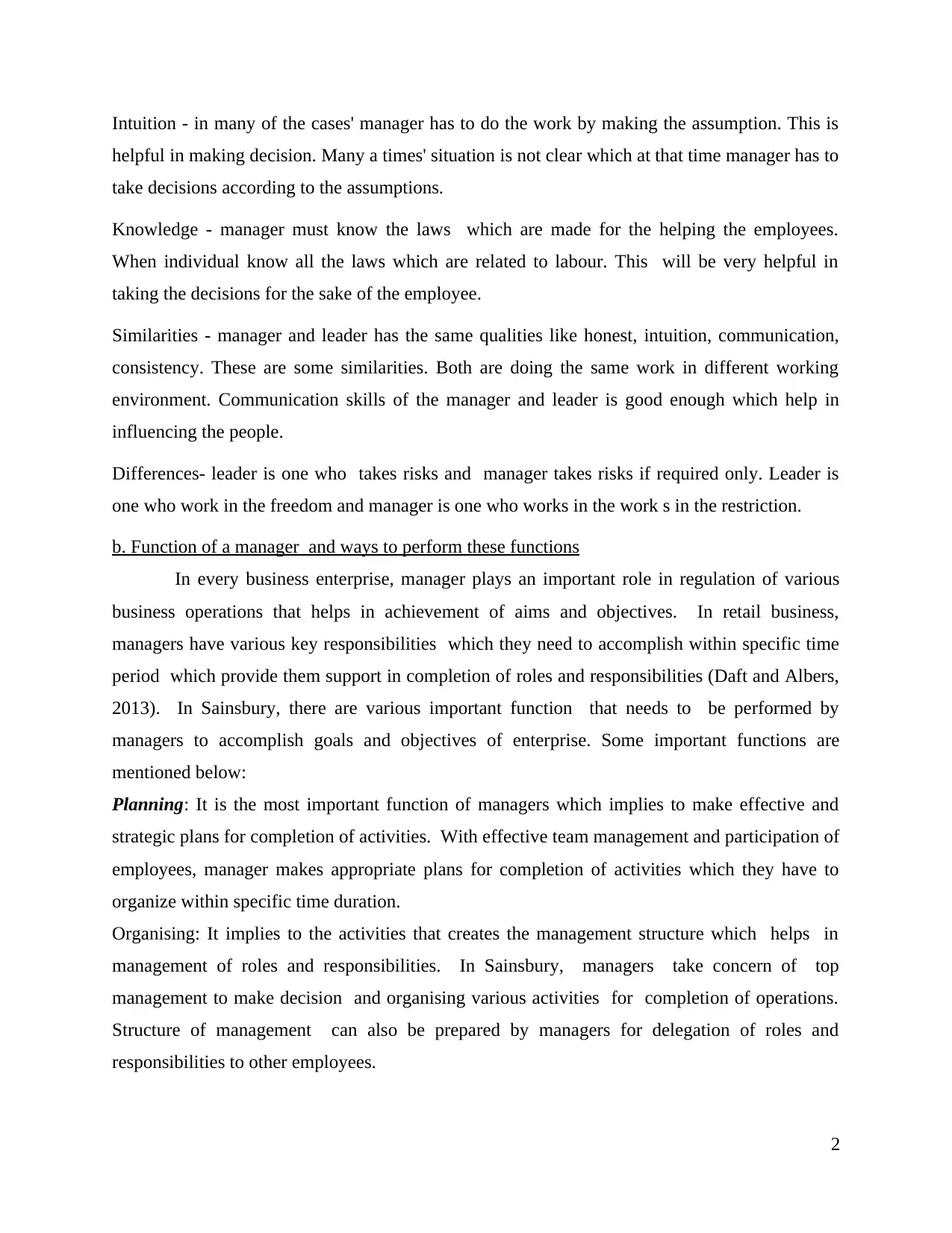
Intuition - in many of the cases' manager has to do the work by making the assumption. This is
helpful in making decision. Many a times' situation is not clear which at that time manager has to
take decisions according to the assumptions.
Knowledge - manager must know the laws which are made for the helping the employees.
When individual know all the laws which are related to labour. This will be very helpful in
taking the decisions for the sake of the employee.
Similarities - manager and leader has the same qualities like honest, intuition, communication,
consistency. These are some similarities. Both are doing the same work in different working
environment. Communication skills of the manager and leader is good enough which help in
influencing the people.
Differences- leader is one who takes risks and manager takes risks if required only. Leader is
one who work in the freedom and manager is one who works in the work s in the restriction.
b. Function of a manager and ways to perform these functions
In every business enterprise, manager plays an important role in regulation of various
business operations that helps in achievement of aims and objectives. In retail business,
managers have various key responsibilities which they need to accomplish within specific time
period which provide them support in completion of roles and responsibilities (Daft and Albers,
2013). In Sainsbury, there are various important function that needs to be performed by
managers to accomplish goals and objectives of enterprise. Some important functions are
mentioned below:
Planning: It is the most important function of managers which implies to make effective and
strategic plans for completion of activities. With effective team management and participation of
employees, manager makes appropriate plans for completion of activities which they have to
organize within specific time duration.
Organising: It implies to the activities that creates the management structure which helps in
management of roles and responsibilities. In Sainsbury, managers take concern of top
management to make decision and organising various activities for completion of operations.
Structure of management can also be prepared by managers for delegation of roles and
responsibilities to other employees.
2
helpful in making decision. Many a times' situation is not clear which at that time manager has to
take decisions according to the assumptions.
Knowledge - manager must know the laws which are made for the helping the employees.
When individual know all the laws which are related to labour. This will be very helpful in
taking the decisions for the sake of the employee.
Similarities - manager and leader has the same qualities like honest, intuition, communication,
consistency. These are some similarities. Both are doing the same work in different working
environment. Communication skills of the manager and leader is good enough which help in
influencing the people.
Differences- leader is one who takes risks and manager takes risks if required only. Leader is
one who work in the freedom and manager is one who works in the work s in the restriction.
b. Function of a manager and ways to perform these functions
In every business enterprise, manager plays an important role in regulation of various
business operations that helps in achievement of aims and objectives. In retail business,
managers have various key responsibilities which they need to accomplish within specific time
period which provide them support in completion of roles and responsibilities (Daft and Albers,
2013). In Sainsbury, there are various important function that needs to be performed by
managers to accomplish goals and objectives of enterprise. Some important functions are
mentioned below:
Planning: It is the most important function of managers which implies to make effective and
strategic plans for completion of activities. With effective team management and participation of
employees, manager makes appropriate plans for completion of activities which they have to
organize within specific time duration.
Organising: It implies to the activities that creates the management structure which helps in
management of roles and responsibilities. In Sainsbury, managers take concern of top
management to make decision and organising various activities for completion of operations.
Structure of management can also be prepared by managers for delegation of roles and
responsibilities to other employees.
2
Paraphrase This Document
Need a fresh take? Get an instant paraphrase of this document with our AI Paraphraser
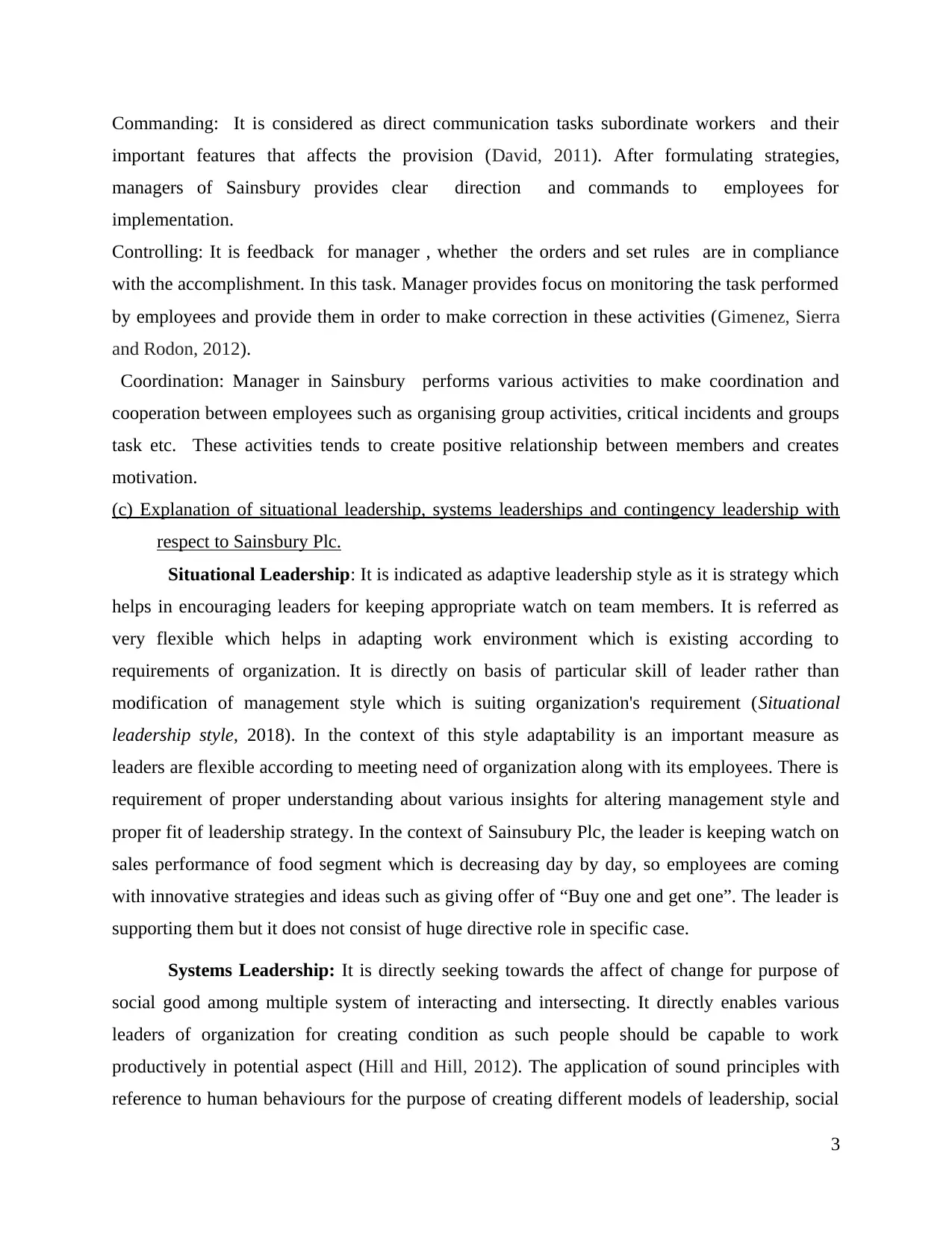
Commanding: It is considered as direct communication tasks subordinate workers and their
important features that affects the provision (David, 2011). After formulating strategies,
managers of Sainsbury provides clear direction and commands to employees for
implementation.
Controlling: It is feedback for manager , whether the orders and set rules are in compliance
with the accomplishment. In this task. Manager provides focus on monitoring the task performed
by employees and provide them in order to make correction in these activities (Gimenez, Sierra
and Rodon, 2012).
Coordination: Manager in Sainsbury performs various activities to make coordination and
cooperation between employees such as organising group activities, critical incidents and groups
task etc. These activities tends to create positive relationship between members and creates
motivation.
(c) Explanation of situational leadership, systems leaderships and contingency leadership with
respect to Sainsbury Plc.
Situational Leadership: It is indicated as adaptive leadership style as it is strategy which
helps in encouraging leaders for keeping appropriate watch on team members. It is referred as
very flexible which helps in adapting work environment which is existing according to
requirements of organization. It is directly on basis of particular skill of leader rather than
modification of management style which is suiting organization's requirement (Situational
leadership style, 2018). In the context of this style adaptability is an important measure as
leaders are flexible according to meeting need of organization along with its employees. There is
requirement of proper understanding about various insights for altering management style and
proper fit of leadership strategy. In the context of Sainsubury Plc, the leader is keeping watch on
sales performance of food segment which is decreasing day by day, so employees are coming
with innovative strategies and ideas such as giving offer of “Buy one and get one”. The leader is
supporting them but it does not consist of huge directive role in specific case.
Systems Leadership: It is directly seeking towards the affect of change for purpose of
social good among multiple system of interacting and intersecting. It directly enables various
leaders of organization for creating condition as such people should be capable to work
productively in potential aspect (Hill and Hill, 2012). The application of sound principles with
reference to human behaviours for the purpose of creating different models of leadership, social
3
important features that affects the provision (David, 2011). After formulating strategies,
managers of Sainsbury provides clear direction and commands to employees for
implementation.
Controlling: It is feedback for manager , whether the orders and set rules are in compliance
with the accomplishment. In this task. Manager provides focus on monitoring the task performed
by employees and provide them in order to make correction in these activities (Gimenez, Sierra
and Rodon, 2012).
Coordination: Manager in Sainsbury performs various activities to make coordination and
cooperation between employees such as organising group activities, critical incidents and groups
task etc. These activities tends to create positive relationship between members and creates
motivation.
(c) Explanation of situational leadership, systems leaderships and contingency leadership with
respect to Sainsbury Plc.
Situational Leadership: It is indicated as adaptive leadership style as it is strategy which
helps in encouraging leaders for keeping appropriate watch on team members. It is referred as
very flexible which helps in adapting work environment which is existing according to
requirements of organization. It is directly on basis of particular skill of leader rather than
modification of management style which is suiting organization's requirement (Situational
leadership style, 2018). In the context of this style adaptability is an important measure as
leaders are flexible according to meeting need of organization along with its employees. There is
requirement of proper understanding about various insights for altering management style and
proper fit of leadership strategy. In the context of Sainsubury Plc, the leader is keeping watch on
sales performance of food segment which is decreasing day by day, so employees are coming
with innovative strategies and ideas such as giving offer of “Buy one and get one”. The leader is
supporting them but it does not consist of huge directive role in specific case.
Systems Leadership: It is directly seeking towards the affect of change for purpose of
social good among multiple system of interacting and intersecting. It directly enables various
leaders of organization for creating condition as such people should be capable to work
productively in potential aspect (Hill and Hill, 2012). The application of sound principles with
reference to human behaviours for the purpose of creating different models of leadership, social
3
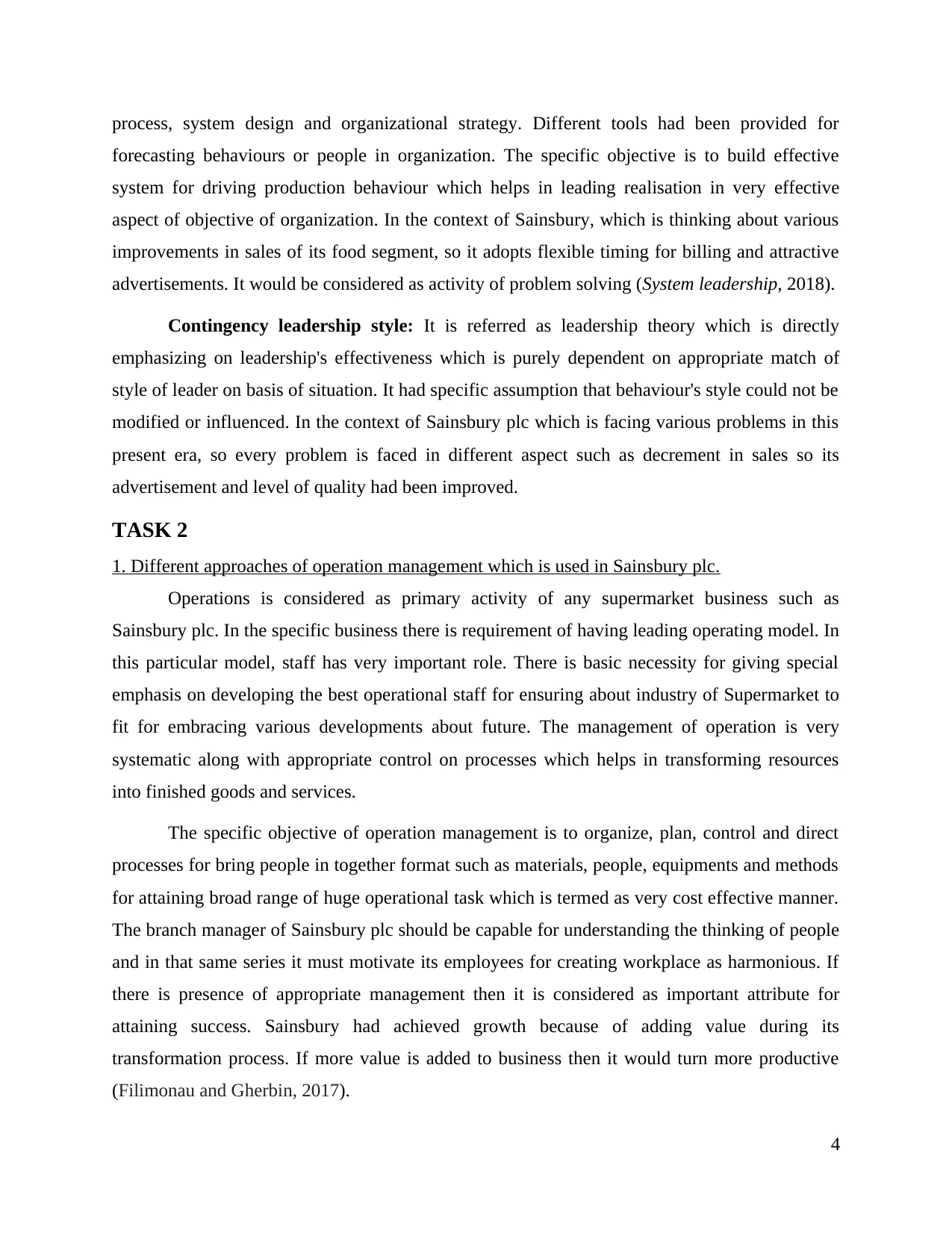
process, system design and organizational strategy. Different tools had been provided for
forecasting behaviours or people in organization. The specific objective is to build effective
system for driving production behaviour which helps in leading realisation in very effective
aspect of objective of organization. In the context of Sainsbury, which is thinking about various
improvements in sales of its food segment, so it adopts flexible timing for billing and attractive
advertisements. It would be considered as activity of problem solving (System leadership, 2018).
Contingency leadership style: It is referred as leadership theory which is directly
emphasizing on leadership's effectiveness which is purely dependent on appropriate match of
style of leader on basis of situation. It had specific assumption that behaviour's style could not be
modified or influenced. In the context of Sainsbury plc which is facing various problems in this
present era, so every problem is faced in different aspect such as decrement in sales so its
advertisement and level of quality had been improved.
TASK 2
1. Different approaches of operation management which is used in Sainsbury plc.
Operations is considered as primary activity of any supermarket business such as
Sainsbury plc. In the specific business there is requirement of having leading operating model. In
this particular model, staff has very important role. There is basic necessity for giving special
emphasis on developing the best operational staff for ensuring about industry of Supermarket to
fit for embracing various developments about future. The management of operation is very
systematic along with appropriate control on processes which helps in transforming resources
into finished goods and services.
The specific objective of operation management is to organize, plan, control and direct
processes for bring people in together format such as materials, people, equipments and methods
for attaining broad range of huge operational task which is termed as very cost effective manner.
The branch manager of Sainsbury plc should be capable for understanding the thinking of people
and in that same series it must motivate its employees for creating workplace as harmonious. If
there is presence of appropriate management then it is considered as important attribute for
attaining success. Sainsbury had achieved growth because of adding value during its
transformation process. If more value is added to business then it would turn more productive
(Filimonau and Gherbin, 2017).
4
forecasting behaviours or people in organization. The specific objective is to build effective
system for driving production behaviour which helps in leading realisation in very effective
aspect of objective of organization. In the context of Sainsbury, which is thinking about various
improvements in sales of its food segment, so it adopts flexible timing for billing and attractive
advertisements. It would be considered as activity of problem solving (System leadership, 2018).
Contingency leadership style: It is referred as leadership theory which is directly
emphasizing on leadership's effectiveness which is purely dependent on appropriate match of
style of leader on basis of situation. It had specific assumption that behaviour's style could not be
modified or influenced. In the context of Sainsbury plc which is facing various problems in this
present era, so every problem is faced in different aspect such as decrement in sales so its
advertisement and level of quality had been improved.
TASK 2
1. Different approaches of operation management which is used in Sainsbury plc.
Operations is considered as primary activity of any supermarket business such as
Sainsbury plc. In the specific business there is requirement of having leading operating model. In
this particular model, staff has very important role. There is basic necessity for giving special
emphasis on developing the best operational staff for ensuring about industry of Supermarket to
fit for embracing various developments about future. The management of operation is very
systematic along with appropriate control on processes which helps in transforming resources
into finished goods and services.
The specific objective of operation management is to organize, plan, control and direct
processes for bring people in together format such as materials, people, equipments and methods
for attaining broad range of huge operational task which is termed as very cost effective manner.
The branch manager of Sainsbury plc should be capable for understanding the thinking of people
and in that same series it must motivate its employees for creating workplace as harmonious. If
there is presence of appropriate management then it is considered as important attribute for
attaining success. Sainsbury had achieved growth because of adding value during its
transformation process. If more value is added to business then it would turn more productive
(Filimonau and Gherbin, 2017).
4
⊘ This is a preview!⊘
Do you want full access?
Subscribe today to unlock all pages.

Trusted by 1+ million students worldwide
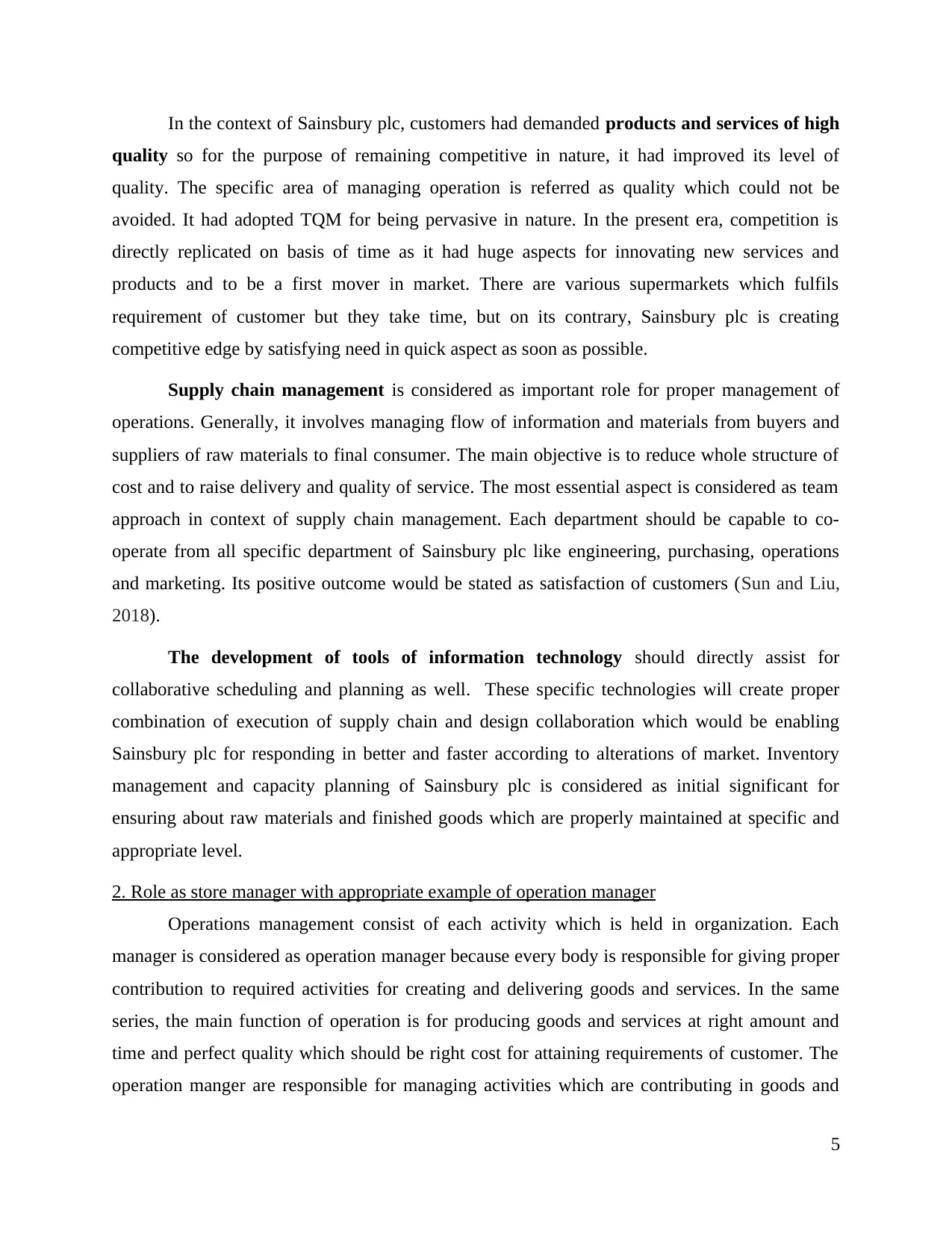
In the context of Sainsbury plc, customers had demanded products and services of high
quality so for the purpose of remaining competitive in nature, it had improved its level of
quality. The specific area of managing operation is referred as quality which could not be
avoided. It had adopted TQM for being pervasive in nature. In the present era, competition is
directly replicated on basis of time as it had huge aspects for innovating new services and
products and to be a first mover in market. There are various supermarkets which fulfils
requirement of customer but they take time, but on its contrary, Sainsbury plc is creating
competitive edge by satisfying need in quick aspect as soon as possible.
Supply chain management is considered as important role for proper management of
operations. Generally, it involves managing flow of information and materials from buyers and
suppliers of raw materials to final consumer. The main objective is to reduce whole structure of
cost and to raise delivery and quality of service. The most essential aspect is considered as team
approach in context of supply chain management. Each department should be capable to co-
operate from all specific department of Sainsbury plc like engineering, purchasing, operations
and marketing. Its positive outcome would be stated as satisfaction of customers (Sun and Liu,
2018).
The development of tools of information technology should directly assist for
collaborative scheduling and planning as well. These specific technologies will create proper
combination of execution of supply chain and design collaboration which would be enabling
Sainsbury plc for responding in better and faster according to alterations of market. Inventory
management and capacity planning of Sainsbury plc is considered as initial significant for
ensuring about raw materials and finished goods which are properly maintained at specific and
appropriate level.
2. Role as store manager with appropriate example of operation manager
Operations management consist of each activity which is held in organization. Each
manager is considered as operation manager because every body is responsible for giving proper
contribution to required activities for creating and delivering goods and services. In the same
series, the main function of operation is for producing goods and services at right amount and
time and perfect quality which should be right cost for attaining requirements of customer. The
operation manger are responsible for managing activities which are contributing in goods and
5
quality so for the purpose of remaining competitive in nature, it had improved its level of
quality. The specific area of managing operation is referred as quality which could not be
avoided. It had adopted TQM for being pervasive in nature. In the present era, competition is
directly replicated on basis of time as it had huge aspects for innovating new services and
products and to be a first mover in market. There are various supermarkets which fulfils
requirement of customer but they take time, but on its contrary, Sainsbury plc is creating
competitive edge by satisfying need in quick aspect as soon as possible.
Supply chain management is considered as important role for proper management of
operations. Generally, it involves managing flow of information and materials from buyers and
suppliers of raw materials to final consumer. The main objective is to reduce whole structure of
cost and to raise delivery and quality of service. The most essential aspect is considered as team
approach in context of supply chain management. Each department should be capable to co-
operate from all specific department of Sainsbury plc like engineering, purchasing, operations
and marketing. Its positive outcome would be stated as satisfaction of customers (Sun and Liu,
2018).
The development of tools of information technology should directly assist for
collaborative scheduling and planning as well. These specific technologies will create proper
combination of execution of supply chain and design collaboration which would be enabling
Sainsbury plc for responding in better and faster according to alterations of market. Inventory
management and capacity planning of Sainsbury plc is considered as initial significant for
ensuring about raw materials and finished goods which are properly maintained at specific and
appropriate level.
2. Role as store manager with appropriate example of operation manager
Operations management consist of each activity which is held in organization. Each
manager is considered as operation manager because every body is responsible for giving proper
contribution to required activities for creating and delivering goods and services. In the same
series, the main function of operation is for producing goods and services at right amount and
time and perfect quality which should be right cost for attaining requirements of customer. The
operation manger are responsible for managing activities which are contributing in goods and
5
Paraphrase This Document
Need a fresh take? Get an instant paraphrase of this document with our AI Paraphraser
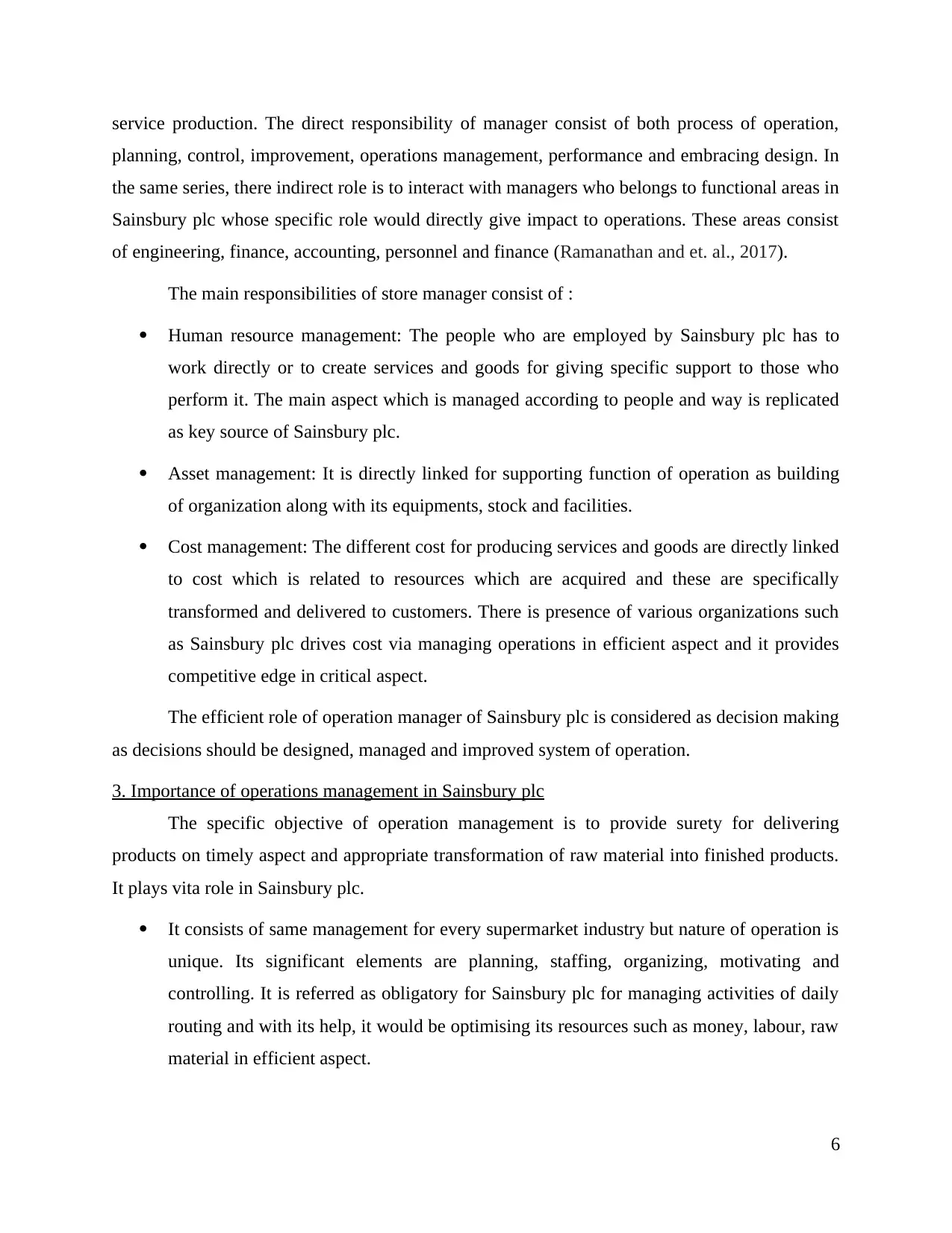
service production. The direct responsibility of manager consist of both process of operation,
planning, control, improvement, operations management, performance and embracing design. In
the same series, there indirect role is to interact with managers who belongs to functional areas in
Sainsbury plc whose specific role would directly give impact to operations. These areas consist
of engineering, finance, accounting, personnel and finance (Ramanathan and et. al., 2017).
The main responsibilities of store manager consist of :
Human resource management: The people who are employed by Sainsbury plc has to
work directly or to create services and goods for giving specific support to those who
perform it. The main aspect which is managed according to people and way is replicated
as key source of Sainsbury plc.
Asset management: It is directly linked for supporting function of operation as building
of organization along with its equipments, stock and facilities.
Cost management: The different cost for producing services and goods are directly linked
to cost which is related to resources which are acquired and these are specifically
transformed and delivered to customers. There is presence of various organizations such
as Sainsbury plc drives cost via managing operations in efficient aspect and it provides
competitive edge in critical aspect.
The efficient role of operation manager of Sainsbury plc is considered as decision making
as decisions should be designed, managed and improved system of operation.
3. Importance of operations management in Sainsbury plc
The specific objective of operation management is to provide surety for delivering
products on timely aspect and appropriate transformation of raw material into finished products.
It plays vita role in Sainsbury plc.
It consists of same management for every supermarket industry but nature of operation is
unique. Its significant elements are planning, staffing, organizing, motivating and
controlling. It is referred as obligatory for Sainsbury plc for managing activities of daily
routing and with its help, it would be optimising its resources such as money, labour, raw
material in efficient aspect.
6
planning, control, improvement, operations management, performance and embracing design. In
the same series, there indirect role is to interact with managers who belongs to functional areas in
Sainsbury plc whose specific role would directly give impact to operations. These areas consist
of engineering, finance, accounting, personnel and finance (Ramanathan and et. al., 2017).
The main responsibilities of store manager consist of :
Human resource management: The people who are employed by Sainsbury plc has to
work directly or to create services and goods for giving specific support to those who
perform it. The main aspect which is managed according to people and way is replicated
as key source of Sainsbury plc.
Asset management: It is directly linked for supporting function of operation as building
of organization along with its equipments, stock and facilities.
Cost management: The different cost for producing services and goods are directly linked
to cost which is related to resources which are acquired and these are specifically
transformed and delivered to customers. There is presence of various organizations such
as Sainsbury plc drives cost via managing operations in efficient aspect and it provides
competitive edge in critical aspect.
The efficient role of operation manager of Sainsbury plc is considered as decision making
as decisions should be designed, managed and improved system of operation.
3. Importance of operations management in Sainsbury plc
The specific objective of operation management is to provide surety for delivering
products on timely aspect and appropriate transformation of raw material into finished products.
It plays vita role in Sainsbury plc.
It consists of same management for every supermarket industry but nature of operation is
unique. Its significant elements are planning, staffing, organizing, motivating and
controlling. It is referred as obligatory for Sainsbury plc for managing activities of daily
routing and with its help, it would be optimising its resources such as money, labour, raw
material in efficient aspect.
6
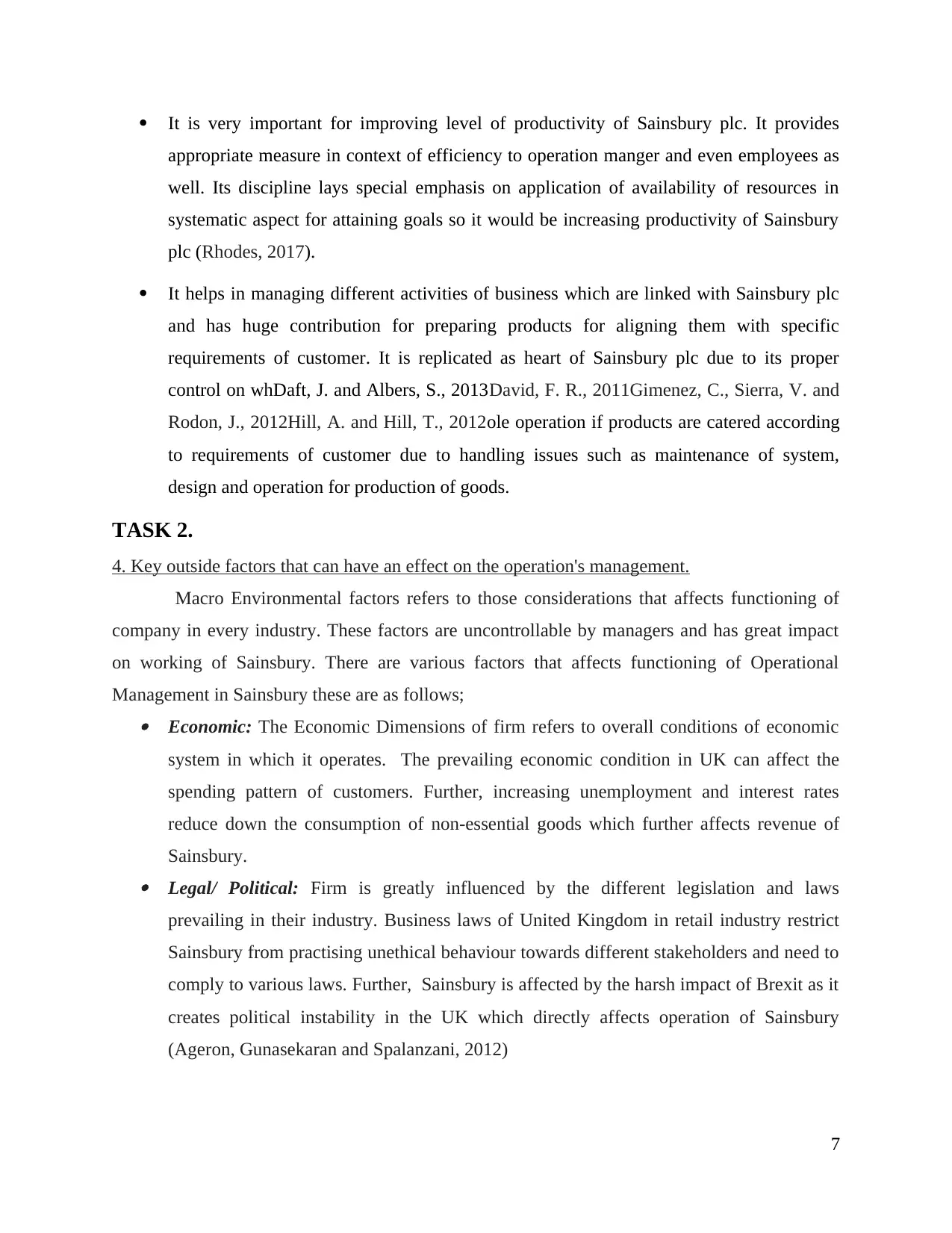
It is very important for improving level of productivity of Sainsbury plc. It provides
appropriate measure in context of efficiency to operation manger and even employees as
well. Its discipline lays special emphasis on application of availability of resources in
systematic aspect for attaining goals so it would be increasing productivity of Sainsbury
plc (Rhodes, 2017).
It helps in managing different activities of business which are linked with Sainsbury plc
and has huge contribution for preparing products for aligning them with specific
requirements of customer. It is replicated as heart of Sainsbury plc due to its proper
control on whDaft, J. and Albers, S., 2013David, F. R., 2011Gimenez, C., Sierra, V. and
Rodon, J., 2012Hill, A. and Hill, T., 2012ole operation if products are catered according
to requirements of customer due to handling issues such as maintenance of system,
design and operation for production of goods.
TASK 2.
4. Key outside factors that can have an effect on the operation's management.
Macro Environmental factors refers to those considerations that affects functioning of
company in every industry. These factors are uncontrollable by managers and has great impact
on working of Sainsbury. There are various factors that affects functioning of Operational
Management in Sainsbury these are as follows; Economic: The Economic Dimensions of firm refers to overall conditions of economic
system in which it operates. The prevailing economic condition in UK can affect the
spending pattern of customers. Further, increasing unemployment and interest rates
reduce down the consumption of non-essential goods which further affects revenue of
Sainsbury. Legal/ Political: Firm is greatly influenced by the different legislation and laws
prevailing in their industry. Business laws of United Kingdom in retail industry restrict
Sainsbury from practising unethical behaviour towards different stakeholders and need to
comply to various laws. Further, Sainsbury is affected by the harsh impact of Brexit as it
creates political instability in the UK which directly affects operation of Sainsbury
(Ageron, Gunasekaran and Spalanzani, 2012)
7
appropriate measure in context of efficiency to operation manger and even employees as
well. Its discipline lays special emphasis on application of availability of resources in
systematic aspect for attaining goals so it would be increasing productivity of Sainsbury
plc (Rhodes, 2017).
It helps in managing different activities of business which are linked with Sainsbury plc
and has huge contribution for preparing products for aligning them with specific
requirements of customer. It is replicated as heart of Sainsbury plc due to its proper
control on whDaft, J. and Albers, S., 2013David, F. R., 2011Gimenez, C., Sierra, V. and
Rodon, J., 2012Hill, A. and Hill, T., 2012ole operation if products are catered according
to requirements of customer due to handling issues such as maintenance of system,
design and operation for production of goods.
TASK 2.
4. Key outside factors that can have an effect on the operation's management.
Macro Environmental factors refers to those considerations that affects functioning of
company in every industry. These factors are uncontrollable by managers and has great impact
on working of Sainsbury. There are various factors that affects functioning of Operational
Management in Sainsbury these are as follows; Economic: The Economic Dimensions of firm refers to overall conditions of economic
system in which it operates. The prevailing economic condition in UK can affect the
spending pattern of customers. Further, increasing unemployment and interest rates
reduce down the consumption of non-essential goods which further affects revenue of
Sainsbury. Legal/ Political: Firm is greatly influenced by the different legislation and laws
prevailing in their industry. Business laws of United Kingdom in retail industry restrict
Sainsbury from practising unethical behaviour towards different stakeholders and need to
comply to various laws. Further, Sainsbury is affected by the harsh impact of Brexit as it
creates political instability in the UK which directly affects operation of Sainsbury
(Ageron, Gunasekaran and Spalanzani, 2012)
7
⊘ This is a preview!⊘
Do you want full access?
Subscribe today to unlock all pages.

Trusted by 1+ million students worldwide
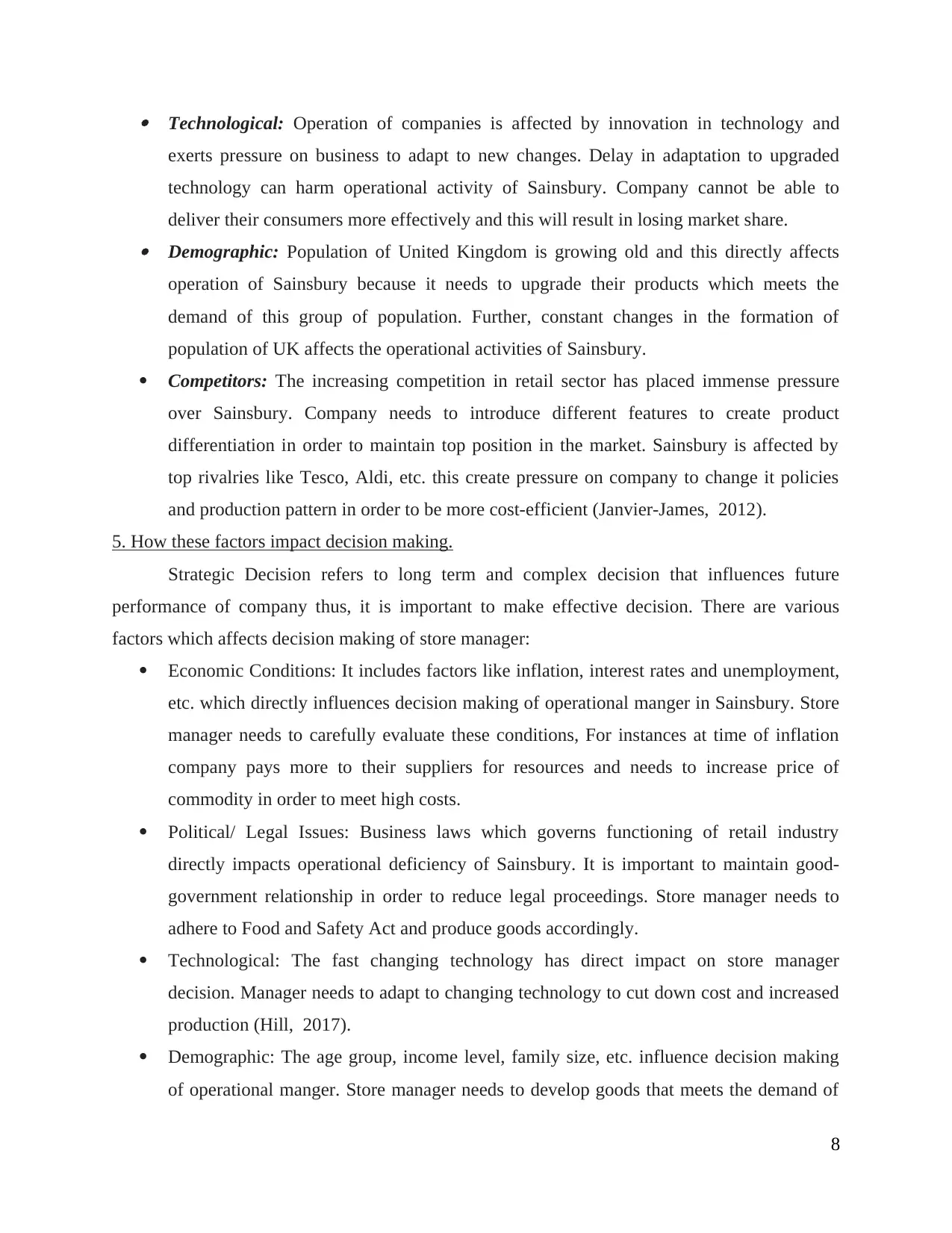
Technological: Operation of companies is affected by innovation in technology and
exerts pressure on business to adapt to new changes. Delay in adaptation to upgraded
technology can harm operational activity of Sainsbury. Company cannot be able to
deliver their consumers more effectively and this will result in losing market share. Demographic: Population of United Kingdom is growing old and this directly affects
operation of Sainsbury because it needs to upgrade their products which meets the
demand of this group of population. Further, constant changes in the formation of
population of UK affects the operational activities of Sainsbury.
Competitors: The increasing competition in retail sector has placed immense pressure
over Sainsbury. Company needs to introduce different features to create product
differentiation in order to maintain top position in the market. Sainsbury is affected by
top rivalries like Tesco, Aldi, etc. this create pressure on company to change it policies
and production pattern in order to be more cost-efficient (Janvier-James, 2012).
5. How these factors impact decision making.
Strategic Decision refers to long term and complex decision that influences future
performance of company thus, it is important to make effective decision. There are various
factors which affects decision making of store manager:
Economic Conditions: It includes factors like inflation, interest rates and unemployment,
etc. which directly influences decision making of operational manger in Sainsbury. Store
manager needs to carefully evaluate these conditions, For instances at time of inflation
company pays more to their suppliers for resources and needs to increase price of
commodity in order to meet high costs.
Political/ Legal Issues: Business laws which governs functioning of retail industry
directly impacts operational deficiency of Sainsbury. It is important to maintain good-
government relationship in order to reduce legal proceedings. Store manager needs to
adhere to Food and Safety Act and produce goods accordingly.
Technological: The fast changing technology has direct impact on store manager
decision. Manager needs to adapt to changing technology to cut down cost and increased
production (Hill, 2017).
Demographic: The age group, income level, family size, etc. influence decision making
of operational manger. Store manager needs to develop goods that meets the demand of
8
exerts pressure on business to adapt to new changes. Delay in adaptation to upgraded
technology can harm operational activity of Sainsbury. Company cannot be able to
deliver their consumers more effectively and this will result in losing market share. Demographic: Population of United Kingdom is growing old and this directly affects
operation of Sainsbury because it needs to upgrade their products which meets the
demand of this group of population. Further, constant changes in the formation of
population of UK affects the operational activities of Sainsbury.
Competitors: The increasing competition in retail sector has placed immense pressure
over Sainsbury. Company needs to introduce different features to create product
differentiation in order to maintain top position in the market. Sainsbury is affected by
top rivalries like Tesco, Aldi, etc. this create pressure on company to change it policies
and production pattern in order to be more cost-efficient (Janvier-James, 2012).
5. How these factors impact decision making.
Strategic Decision refers to long term and complex decision that influences future
performance of company thus, it is important to make effective decision. There are various
factors which affects decision making of store manager:
Economic Conditions: It includes factors like inflation, interest rates and unemployment,
etc. which directly influences decision making of operational manger in Sainsbury. Store
manager needs to carefully evaluate these conditions, For instances at time of inflation
company pays more to their suppliers for resources and needs to increase price of
commodity in order to meet high costs.
Political/ Legal Issues: Business laws which governs functioning of retail industry
directly impacts operational deficiency of Sainsbury. It is important to maintain good-
government relationship in order to reduce legal proceedings. Store manager needs to
adhere to Food and Safety Act and produce goods accordingly.
Technological: The fast changing technology has direct impact on store manager
decision. Manager needs to adapt to changing technology to cut down cost and increased
production (Hill, 2017).
Demographic: The age group, income level, family size, etc. influence decision making
of operational manger. Store manager needs to develop goods that meets the demand of
8
Paraphrase This Document
Need a fresh take? Get an instant paraphrase of this document with our AI Paraphraser
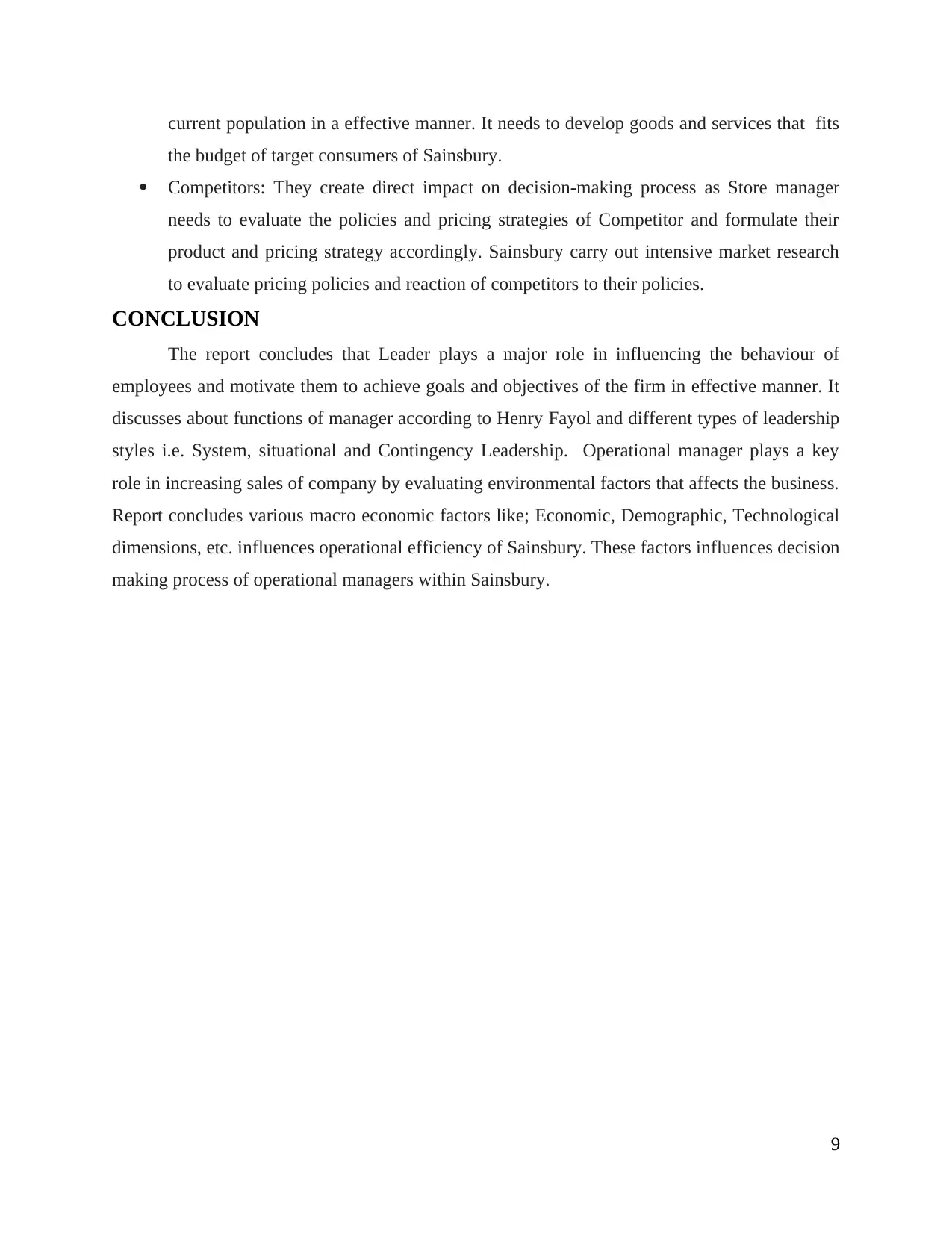
current population in a effective manner. It needs to develop goods and services that fits
the budget of target consumers of Sainsbury.
Competitors: They create direct impact on decision-making process as Store manager
needs to evaluate the policies and pricing strategies of Competitor and formulate their
product and pricing strategy accordingly. Sainsbury carry out intensive market research
to evaluate pricing policies and reaction of competitors to their policies.
CONCLUSION
The report concludes that Leader plays a major role in influencing the behaviour of
employees and motivate them to achieve goals and objectives of the firm in effective manner. It
discusses about functions of manager according to Henry Fayol and different types of leadership
styles i.e. System, situational and Contingency Leadership. Operational manager plays a key
role in increasing sales of company by evaluating environmental factors that affects the business.
Report concludes various macro economic factors like; Economic, Demographic, Technological
dimensions, etc. influences operational efficiency of Sainsbury. These factors influences decision
making process of operational managers within Sainsbury.
9
the budget of target consumers of Sainsbury.
Competitors: They create direct impact on decision-making process as Store manager
needs to evaluate the policies and pricing strategies of Competitor and formulate their
product and pricing strategy accordingly. Sainsbury carry out intensive market research
to evaluate pricing policies and reaction of competitors to their policies.
CONCLUSION
The report concludes that Leader plays a major role in influencing the behaviour of
employees and motivate them to achieve goals and objectives of the firm in effective manner. It
discusses about functions of manager according to Henry Fayol and different types of leadership
styles i.e. System, situational and Contingency Leadership. Operational manager plays a key
role in increasing sales of company by evaluating environmental factors that affects the business.
Report concludes various macro economic factors like; Economic, Demographic, Technological
dimensions, etc. influences operational efficiency of Sainsbury. These factors influences decision
making process of operational managers within Sainsbury.
9
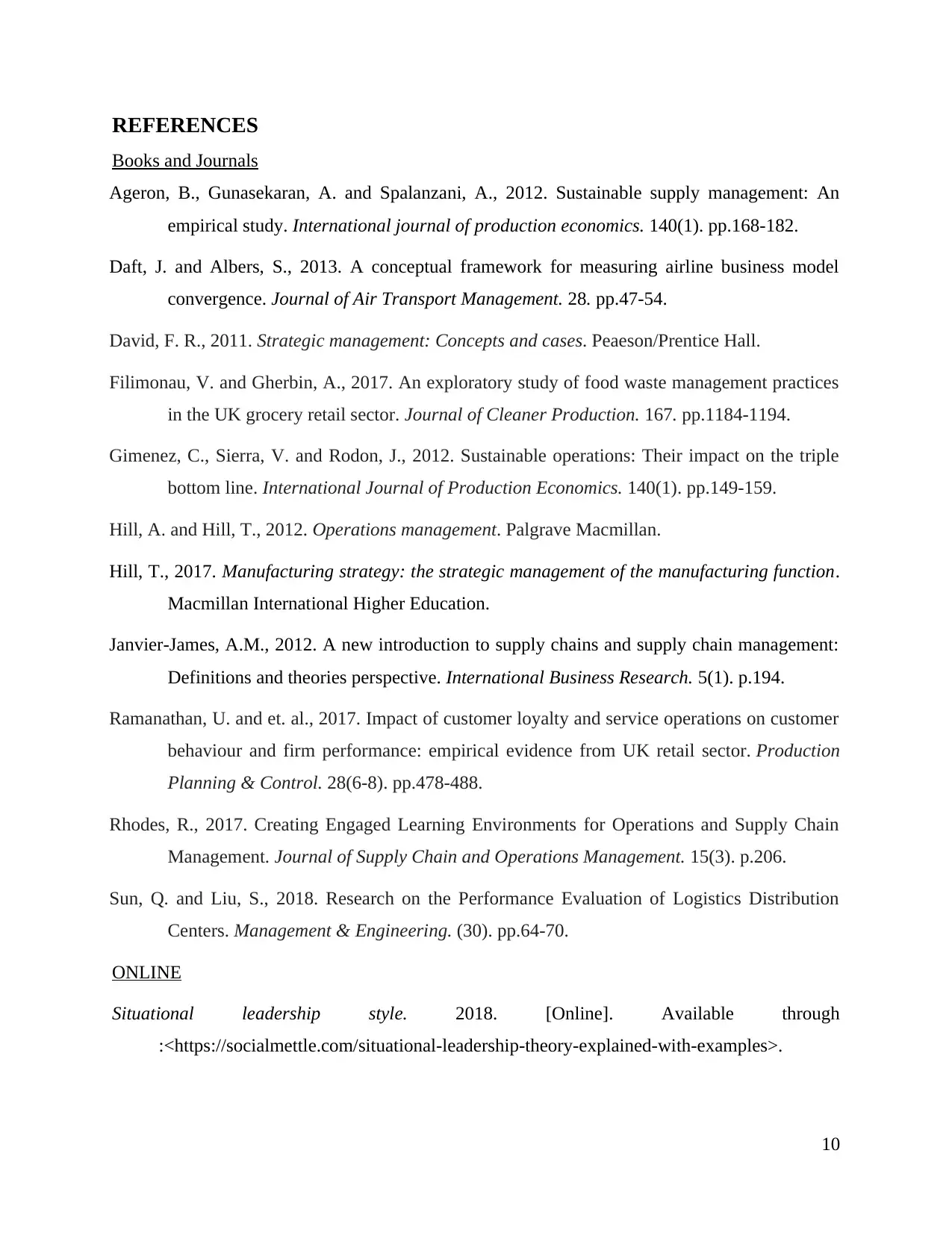
REFERENCES
Books and Journals
Ageron, B., Gunasekaran, A. and Spalanzani, A., 2012. Sustainable supply management: An
empirical study. International journal of production economics. 140(1). pp.168-182.
Daft, J. and Albers, S., 2013. A conceptual framework for measuring airline business model
convergence. Journal of Air Transport Management. 28. pp.47-54.
David, F. R., 2011. Strategic management: Concepts and cases. Peaeson/Prentice Hall.
Filimonau, V. and Gherbin, A., 2017. An exploratory study of food waste management practices
in the UK grocery retail sector. Journal of Cleaner Production. 167. pp.1184-1194.
Gimenez, C., Sierra, V. and Rodon, J., 2012. Sustainable operations: Their impact on the triple
bottom line. International Journal of Production Economics. 140(1). pp.149-159.
Hill, A. and Hill, T., 2012. Operations management. Palgrave Macmillan.
Hill, T., 2017. Manufacturing strategy: the strategic management of the manufacturing function.
Macmillan International Higher Education.
Janvier-James, A.M., 2012. A new introduction to supply chains and supply chain management:
Definitions and theories perspective. International Business Research. 5(1). p.194.
Ramanathan, U. and et. al., 2017. Impact of customer loyalty and service operations on customer
behaviour and firm performance: empirical evidence from UK retail sector. Production
Planning & Control. 28(6-8). pp.478-488.
Rhodes, R., 2017. Creating Engaged Learning Environments for Operations and Supply Chain
Management. Journal of Supply Chain and Operations Management. 15(3). p.206.
Sun, Q. and Liu, S., 2018. Research on the Performance Evaluation of Logistics Distribution
Centers. Management & Engineering. (30). pp.64-70.
ONLINE
Situational leadership style. 2018. [Online]. Available through
:<https://socialmettle.com/situational-leadership-theory-explained-with-examples>.
10
Books and Journals
Ageron, B., Gunasekaran, A. and Spalanzani, A., 2012. Sustainable supply management: An
empirical study. International journal of production economics. 140(1). pp.168-182.
Daft, J. and Albers, S., 2013. A conceptual framework for measuring airline business model
convergence. Journal of Air Transport Management. 28. pp.47-54.
David, F. R., 2011. Strategic management: Concepts and cases. Peaeson/Prentice Hall.
Filimonau, V. and Gherbin, A., 2017. An exploratory study of food waste management practices
in the UK grocery retail sector. Journal of Cleaner Production. 167. pp.1184-1194.
Gimenez, C., Sierra, V. and Rodon, J., 2012. Sustainable operations: Their impact on the triple
bottom line. International Journal of Production Economics. 140(1). pp.149-159.
Hill, A. and Hill, T., 2012. Operations management. Palgrave Macmillan.
Hill, T., 2017. Manufacturing strategy: the strategic management of the manufacturing function.
Macmillan International Higher Education.
Janvier-James, A.M., 2012. A new introduction to supply chains and supply chain management:
Definitions and theories perspective. International Business Research. 5(1). p.194.
Ramanathan, U. and et. al., 2017. Impact of customer loyalty and service operations on customer
behaviour and firm performance: empirical evidence from UK retail sector. Production
Planning & Control. 28(6-8). pp.478-488.
Rhodes, R., 2017. Creating Engaged Learning Environments for Operations and Supply Chain
Management. Journal of Supply Chain and Operations Management. 15(3). p.206.
Sun, Q. and Liu, S., 2018. Research on the Performance Evaluation of Logistics Distribution
Centers. Management & Engineering. (30). pp.64-70.
ONLINE
Situational leadership style. 2018. [Online]. Available through
:<https://socialmettle.com/situational-leadership-theory-explained-with-examples>.
10
⊘ This is a preview!⊘
Do you want full access?
Subscribe today to unlock all pages.

Trusted by 1+ million students worldwide
1 out of 13
Related Documents
Your All-in-One AI-Powered Toolkit for Academic Success.
+13062052269
info@desklib.com
Available 24*7 on WhatsApp / Email
![[object Object]](/_next/static/media/star-bottom.7253800d.svg)
Unlock your academic potential
Copyright © 2020–2026 A2Z Services. All Rights Reserved. Developed and managed by ZUCOL.




